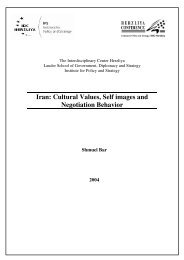Bashar's Syria: The Regime and its Strategic Worldview Shmuel Bar ...
Bashar's Syria: The Regime and its Strategic Worldview Shmuel Bar ...
Bashar's Syria: The Regime and its Strategic Worldview Shmuel Bar ...
Create successful ePaper yourself
Turn your PDF publications into a flip-book with our unique Google optimized e-Paper software.
362 S. <strong>Bar</strong>of Lebanon, with which <strong>Syria</strong> has never (even before the <strong>Syria</strong>n occupation of 1975) exchangedembassies on the grounds that there is no need for embassies between two parts ofthe same country.<strong>The</strong> ideology of pan-Arabism remained in the rhetoric of the Ba’th party, but the word“Arab” became more <strong>and</strong> more a code word for <strong>Syria</strong>. <strong>The</strong> overt emphasis on “Arab” identityserves the regime’s interests: Domestically—to discourage signs of localism <strong>and</strong> sectarianism, on one h<strong>and</strong>, <strong>and</strong>to obfuscate the sectarian nature of the Alawite-led regime, as the other. Outwards to the Arab world—the implicit message is that <strong>Syria</strong> is willing tosacrifice <strong>its</strong> own local interests for those of the “Arab Nation,” <strong>and</strong> it will preferthe interests of other Arabs over any other circle of association that <strong>Syria</strong> may bein (Islamic, nonaligned). However, it expects other countries to do the same. Thusthe ideology is translated into a dem<strong>and</strong> that Arab countries respect <strong>Syria</strong>’s vitalinterests as defined by Damascus. When these encompass such wideranging issuessuch as Lebanon <strong>and</strong> the Israeli-Arab conflict, this position, when accepted, provided<strong>Syria</strong> with disproportional regional status. In practical terms, this allowed <strong>Syria</strong> todem<strong>and</strong> <strong>and</strong> receive across-the-board Arab recognition of <strong>its</strong> own vested interestsin Lebanon <strong>and</strong> vis-à-vis Israel. This was expressed in Arab League summ<strong>its</strong> <strong>and</strong><strong>Syria</strong>’s leverage over the other Arabs in the international arena.Party membership usually involves entire families. Many of the families do not rise tothe national level <strong>and</strong> continue to provide the local strongmen to the branches of the partyin their home areas. While there is not enough detailed information on the party apparatuson the branch level, it is widely known that many positions are allocated on a nepotisticbasis.<strong>The</strong> centralist nature of the <strong>Syria</strong>n regime under Hafez al-Asad restricted the potentialfor party power bases to develop past the local level. <strong>The</strong> fact that the Regional Congresswas not convened for fifteen years, <strong>and</strong> the Central Committee played no more than a rubberstamp role, limited the ability of senior party members to develop independent power bases.For the time being Bashar’s policy of strengthening the party as a power base for himselfhas been counterbalanced by his infusion of extraparty technocrats into key posts.<strong>The</strong>re is no real distinction between power bases of the Ba’th party <strong>and</strong> those of theregime or the country in general. All the above power bases are also intimately intertwined;while not all economic or military power bases are tribal based, those that are not frequentlymarry into the tribal system in order to cement their power base. At the same time, a tribalpower base alone is not enough; the prominent families <strong>and</strong> tribes use their social leverageto gain positions in the party apparatus, to appoint their sons to senior posts in the army, <strong>and</strong>to create economic power bases for themselves. <strong>The</strong> nodal relationships between echelonsof the regime allow those at the top ranks of the regime to bestow privileges <strong>and</strong> thus toguarantee the loyalty of those beneath them. <strong>The</strong>se privileges include: Membership in the party—<strong>The</strong> recruitment system described above delegates authorityto the Branch Comm<strong>and</strong> (in fact, the Branch Secretary) to approve the membershipof a c<strong>and</strong>idate in the party. Party <strong>and</strong> public office—<strong>The</strong> Branch Comm<strong>and</strong>s have extensive control over theprocess of elections to the constituent bodies of the party in the Branch <strong>and</strong> recommendpeople for office in the local government to which they belong. Protection from harassment by the mokhabarat.
















